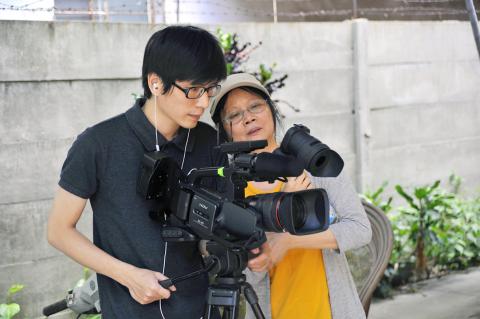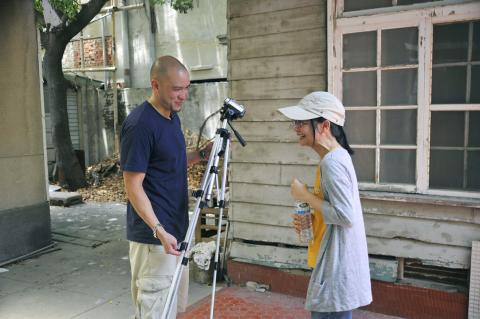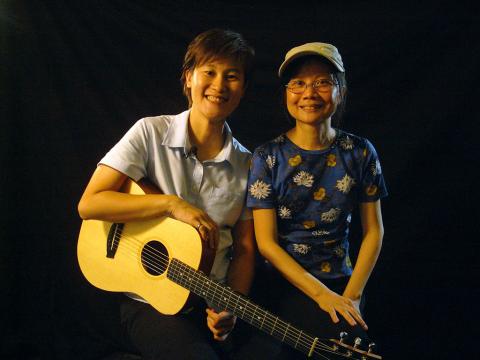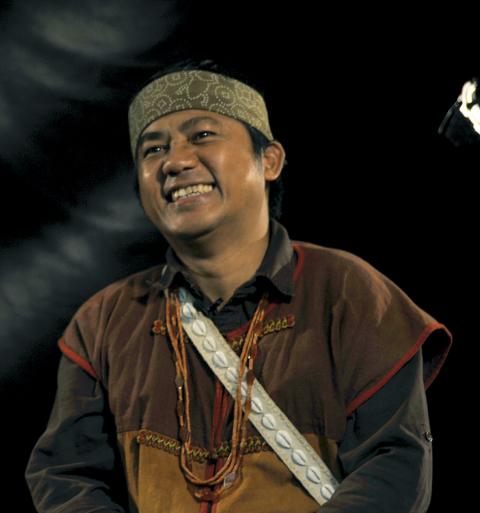Dear Taiwan (好國好民) opens with a short statement that captures the complexity of its subject: “Who am I is a simple question, with no simple answer for Taiwanese people.”
Directed by filmmaker and social activist Chen Lih-kuei (陳麗貴), the film, which premiered last week at National Taiwan University, focuses on the issue of Taiwanese identity among people who came of age during the end of the martial law era. Starting today at 7:30pm, Dear Taiwan will be shown every Thursday and Saturday at Cafe Philo’s (慕哲咖啡館) new location on Shaoxing North Street (紹興北街), Taipei City, until Dec. 3. The film is also available for independent screenings with English, Chinese and Japanese subtitles (for more information about obtaining a DVD and a schedule of additional screenings, visit deartaiwan.blogspot.com).
The background of Chen’s interviewees reflects the diversity of ethnicities and cultures in this country, including Hoklo, Hakka, Aboriginal and waishengren (外省人, or descendants of people who immigrated from China after the Chinese Civil War). One, activist Ahbying (阿明), also known as Eric Chang (張浩明), grew up in the US. Several musicians whose work deals with Taiwan’s cultural identity and independence are featured, including Fan Chiang (范姜) and fishLIN of hip-hop group Kou Chou Ching (拷秋勤) and Freddy Lim (林昶佐) of Chthonic (閃靈).

Photo Courtesy of Dear Taiwan
Many of Dear Taiwan’s subjects talk about the emotional upheaval they felt as they began to question what they had been taught in school during the martial law era, or as their own sense of national and cultural identity began to conflict with that of close family members.
Linus Pu’s (濮思明) father came to Taiwan with the Chinese Nationalist (KMT) army when he was 19 years old. Pu says his parent’s desire to see China and Taiwan unified was on par with his wish to see his two sons grow up. As Pu became active in social movements, however, his support of Taiwanese independence was cemented despite his loyalty to his father, who passed away when Pu was a teenager.
“I was nurtured by a land called Taiwan, so I call myself Taiwanese,” says Pu in the film.

Photo Courtesy of Dear Taiwan
Chen says she began to think of her own identity while working in Chicago as a reporter for a US-based Chinese-language newspaper during the late 1980s. During a chat with a fellow Taiwanese expat, Chen told her friend about studying Mandarin in school when the Chinese Nationalist government forbade the teaching of other dialects. Though Chen’s mother, born in 1925 and educated during the Japanese colonial era, was not fluent in Mandarin, she forced herself to speak it with her children instead of her native Hoklo (commonly known as Taiwanese).
“I told my friend how impressed I was that my mother started speaking Mandarin to us,” Chen recalls. “But then my friend asked me, ‘Didn’t you ever think it was because your mother did not want you to look down on her?’”
“It hurt me so much to hear that,” says Chen. “That’s when the process of thinking about Taiwanese identity started for me.”

Photo Courtesy of Dear Taiwan
Some of Dear Taiwan’s interviewees recall the shock of learning about events like the 228 Incident after martial law was lifted. Chthonic lead vocalist Lim says his teachers quietly encouraged their students to seek out alternative sources of information besides their textbooks. When what he read in academic journals published abroad conflicted with what he had been taught about Taiwan’s history in school, Lim felt confused.
“That invalidated my life as I knew it,” Lim says in the film.
In an interview with the Taipei Times after the film’s premiere screening on Oct. 19, Lim said he hopes the film will reach a global audience.

Photo Courtesy of Dear Taiwan
“I think people from around the world need to see it. Because when you talk to Taiwanese people, it should be like when you talk to Irish people or Quebecois people,” says Lim. “You can’t say Irish people are English or that all Quebecois are Canadian when many of them feel that Quebec is a country within a country.”
The movie’s US promotional team is currently seeking venues across that country, in part to reach out to younger people of Taiwanese descent, says Herbert Chang (張皓博), one of the film’s English language translators.
“[Dear Taiwan] paints a better picture of who the Taiwanese people are. Yes it is confusing, but the film does a good job of illustrating exactly why it is confusing, and therefore the importance of the topic,” said Chang in an e-mail interview.
One segment of Dear Taiwan focuses on a debate held at Cafe Philo with about 40 Taiwanese and Chinese university students. During the event, which was organized by the Youth Synergy Taiwan Foundation (青平台), participants expressed opinions ranging from the belief that unification is necessary for stability in East Asia to “the Republic of China died in 1949.”
Despite the heated discussion, Chen says the atmosphere at the debate, which took place in June, was relaxed. She adds that there were several Chinese students who supported Taiwanese independence, but were wary about saying so on camera.
“I was surprised, because if I want to talk to people from my own generation [about Taiwanese identity and independence], especially if we are from different backgrounds, I would feel a little bit uncomfortable and worried that I would hurt their feelings,” she says.
“But [at Cafe Philo], everyone was very open and honest, which is why I included so much footage from it. I want people to realize that this kind of discussion is not frightening.”
Chen hopes that message will reach people across the political spectrum. She recalls speaking with a student after the National Taiwan University screening.
“She told me that everyone in her home supports the KMT, so she felt uneasy at first. She thought she would be surrounded by people who were completely different, culturally, from her,” says Chen.
“But after she saw the movie, she told me she thought it was very rational and she felt she could relate to it,” says Chen. ”She thanked me, but I actually felt very thankful for what she said, because my goal is to encourage more people to think about this issue.”
EVENT INFO
WHAT: Dear Taiwan at Cafe Philo (慕哲咖啡館). Chen Lih-kuei (陳麗貴) will participate in a question and answer session after the film
WHEN: Tonight at 7:30pm. Additional screenings will take place Thursdays at 7:30pm and Saturdays at 5pm at Cafe Philo until Dec. 3
WHERE: 3 Shaoxing N St, Taipei City (台北市紹興北街3號)
ADMISSION: Free
ON THE NET: For a schedule of additional screenings, visit deartaiwan.blogspot.com. The Cafe Philo screenings will have Chinese subtitles. The film is available with Chinese, English and Japanese subtitles for independently arranged events. For more information, visit the film’s Web site or send an e-mail to contact.deartaiwan@gmail.com

In recent weeks the Trump Administration has been demanding that Taiwan transfer half of its chip manufacturing to the US. In an interview with NewsNation, US Secretary of Commerce Howard Lutnick said that the US would need 50 percent of domestic chip production to protect Taiwan. He stated, discussing Taiwan’s chip production: “My argument to them was, well, if you have 95 percent, how am I gonna get it to protect you? You’re going to put it on a plane? You’re going to put it on a boat?” The stench of the Trump Administration’s mafia-style notions of “protection” was strong

Every now and then, it’s nice to just point somewhere on a map and head out with no plan. In Taiwan, where convenience reigns, food options are plentiful and people are generally friendly and helpful, this type of trip is that much easier to pull off. One day last November, a spur-of-the-moment day hike in the hills of Chiayi County turned into a surprisingly memorable experience that impressed on me once again how fortunate we all are to call this island home. The scenery I walked through that day — a mix of forest and farms reaching up into the clouds

With one week left until election day, the drama is high in the race for the Chinese Nationalist Party (KMT) chair. The race is still potentially wide open between the three frontrunners. The most accurate poll is done by Apollo Survey & Research Co (艾普羅民調公司), which was conducted a week and a half ago with two-thirds of the respondents party members, who are the only ones eligible to vote. For details on the candidates, check the Oct. 4 edition of this column, “A look at the KMT chair candidates” on page 12. The popular frontrunner was 56-year-old Cheng Li-wun (鄭麗文)

Oct. 13 to Oct. 19 When ordered to resign from her teaching position in June 1928 due to her husband’s anti-colonial activities, Lin Shih-hao (林氏好) refused to back down. The next day, she still showed up at Tainan Second Preschool, where she was warned that she would be fired if she didn’t comply. Lin continued to ignore the orders and was eventually let go without severance — even losing her pay for that month. Rather than despairing, she found a non-government job and even joined her husband Lu Ping-ting’s (盧丙丁) non-violent resistance and labor rights movements. When the government’s 1931 crackdown